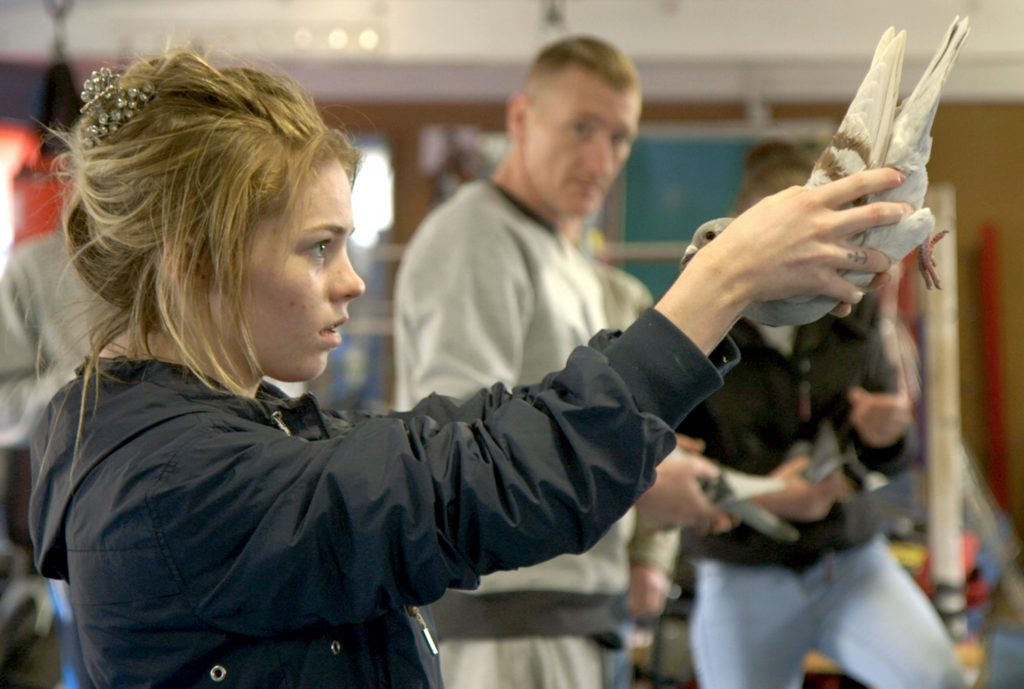April 26, 2019
by Carla Hay

“Scheme Birds”
Directed by Ellen Fiske and Ellinor Hallin
World premiere at the Tribeca Film Festival in New York City on April 26, 2019.
This bleak documentary about lower-class Scottish teens takes its title from the term used to describe females who are always on the hustle. At the center of the story is the film’s narrator, Gemma, a pretty blonde rebel who lives a rough-and-tumble lifestyle where she predicts she’ll either get “knocked up or locked up.” She lives in the steel town of Motherwell, Scotland, which was thriving in previous generations, but the manufacturing jobs have all but disappeared, and the community has been an economic downward spiral ever since. Gemma’s close circle of juvenile-delinquent confidants are her boyfriend Pat; her best friend, Amy; and Amy’s boyfriend JP. All of them are school dropouts who spend their days and nights not doing much but making mischief, partying, and sometimes getting into gang fights. Their accents are so thick and filled with so much slang that the movie has subtitles.
The most important adult in Gemma’s life is her paternal grandfather Joseph, who has essentially raised Gemma with his wife. Gemma has no relationship with her biological parents. As it’s described in the movie, her mother is a drug addict who abandoned Gemma as a baby, and her father passed on the responsibility of raising Gemma to his parents. Joseph has a hobby of raising pigeons and selling them to the locals. He also works at a boxing gym, and he tries to get Gemma interested in boxing and/or his side business of raising pigeons, but she’d rather continue her ambition-less existence in the council flats (the United Kingdom equivalent of public housing) where she and her family and friends live.
After being introduced in the first third of the movie, Joseph essentially isn’t seen again, as Gemma’s life undergoes a major change when she gets pregnant with Pat’s child. The documentary follows Gemma through her pregnancy and the birth of their son. Becoming a mother changes Gemma’s priorities dramatically, and her hard edge softens as her maternal instinct gives her a different perspective on life. She and Pat seem ready to settle down, and they try to become responsible parents by giving up their hard-partying lifestyle.
But life isn’t a fairy tale, especially in Gemma’s world, where expectations are low, ambition is discouraged, and people don’t have much motivation to get out of their rut of disenfranchisement. When it’s easier for unskilled young people in that world to get money by committing crimes or living on welfare than it is by getting a job, it’s no wonder that many are tempted to take the easier ways to get money. When a tragedy hits someone in Gemma’s social circle, it has long-lasting and damaging effects. That tragedy is the most emotionally riveting part of the movie.
Even though Gemma and her friends have what many people consider to be depressing lives, it’s hard to feel too sorry for them because many of their problems are of their own doing. They don’t have “third world” poverty because they are fortunate to live in a country where financially disadvantaged people can live off of government assistance. They also have access to birth control, unlike many people in truly impoverished areas of the world, so there’s really not much of an excuse for the rampant teen pregnancy in their community. The same places where chain-smoking, hard-drinking Gemma and her friends get their cigarettes and booze are the same places where they can get condoms. Birth control is obviously a low priority for people in this movie.
Even when Gemma becomes a mother, decides to sober up, and looks for a job, things come fairly easily to her. After she applies for a low-paying job at a local café by filling out an application online, even though she has no experience, she gets the job just by calling up the manager and saying that she’s a responsible person. Even the most low-paying café jobs nowadays still require applicants to meet the hiring manager in person, so it’s an uncommon stroke of luck that Gemma gets the job just by having a brief conversation with a stranger over the phone.
“Scheme Birds” was directed by Ellen Fiske and Ellinor Hallin, two filmmakers from Sweden, a country that is considered one of the most advanced in the world when it comes to how it takes care of its financially disadvantaged citizens. Perhaps Fiske and Hallin thought this documentary would be more compelling if it focused on someone who looks like the girls who star in the MTV reality show “Teen Mom.” Unfortunately, Gemma’s story is not unusual enough to have a lasting impact on viewers, and the fact that she takes for granted so many privileges that she has makes her even less sympathetic. There are millions of impoverished teenage mothers who face even more obstacles and challenges because of the color of their skin or because they live in a third-world country. But those aren’t the kind of girls who get cast on reality shows or have tabloid stories written about them, so it’s not a surprise that a lot of documentary filmmakers don’t want to tell their stories.
